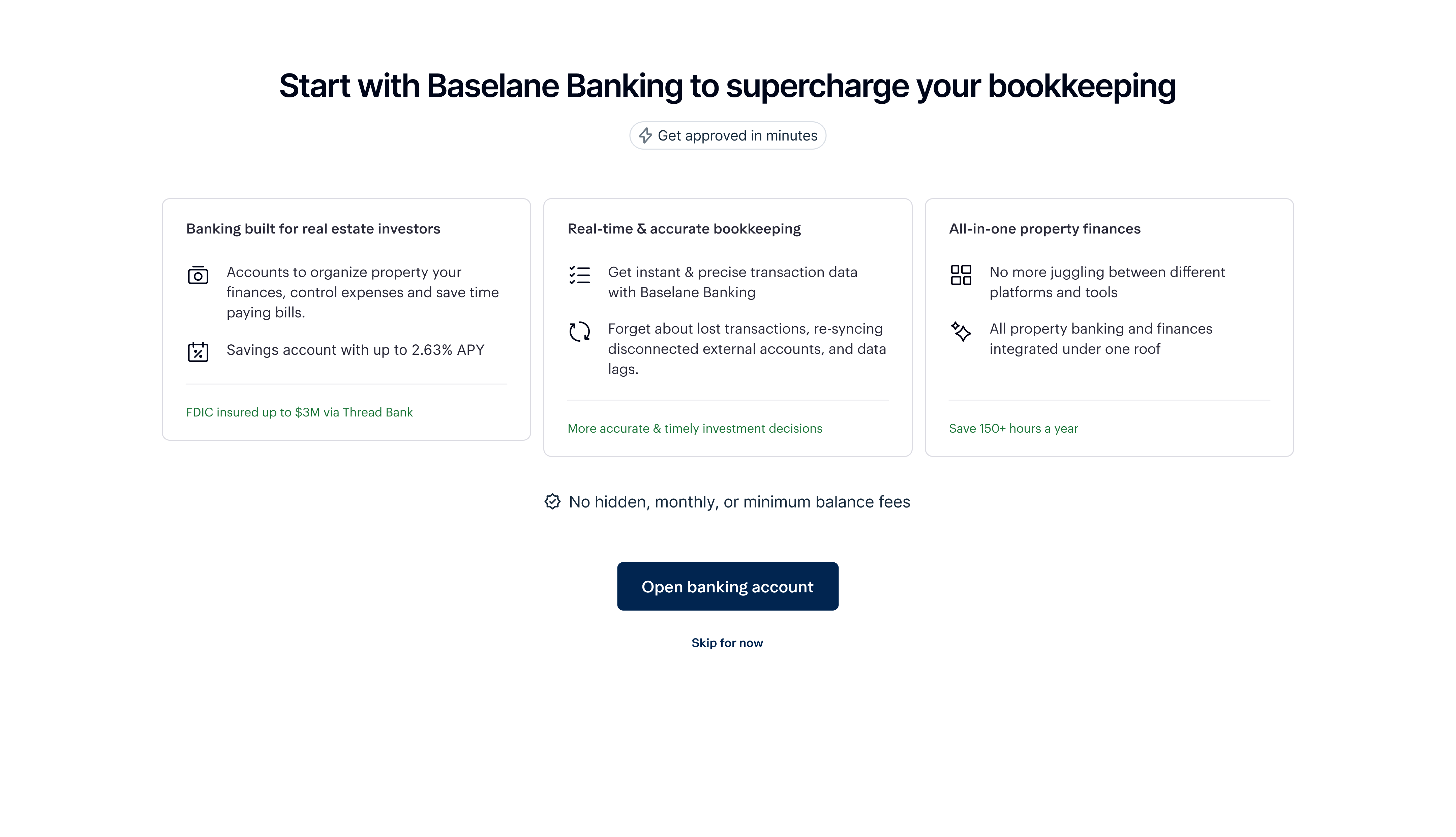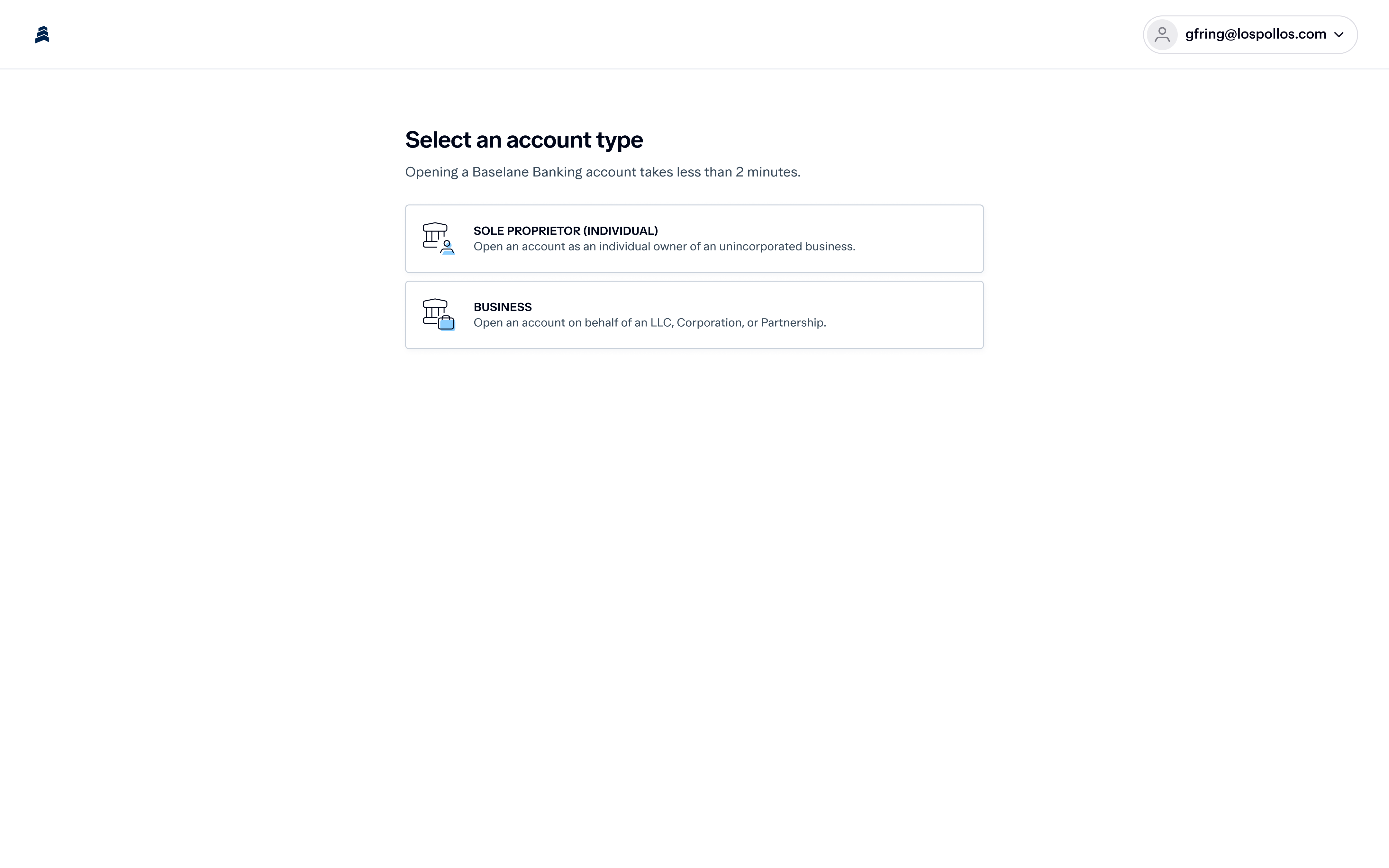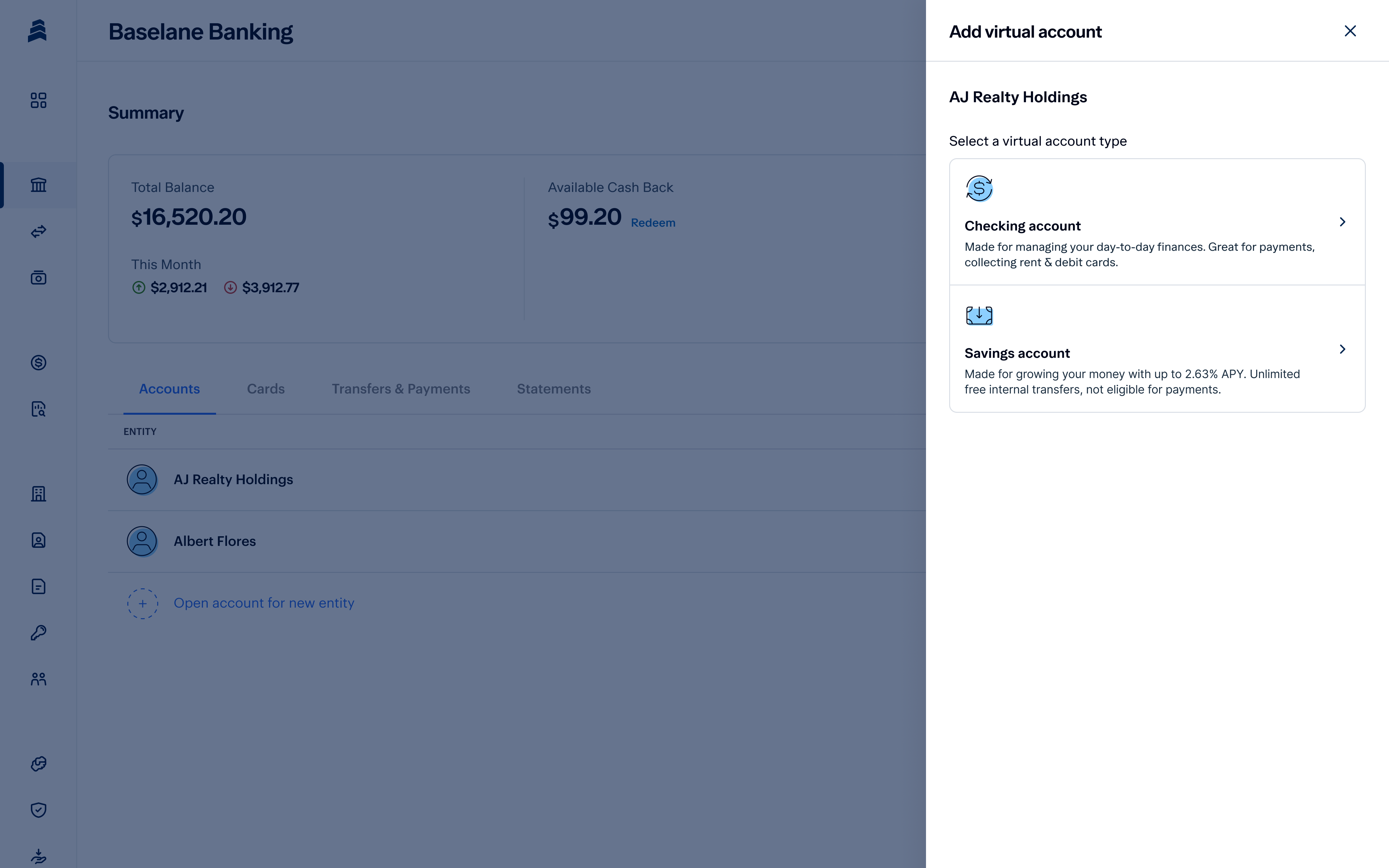Setting up a Limited Liability Company (LLC) for your real estate investments is a smart move to protect your assets. But forming the LLC is only the first step. To separate your finances and unlock the full benefits of liability protection, it’s important to understand how to open a business bank account for an LLC.
This guide will walk you through the process, what you’ll need, how it works, and why doing it online is often the simplest and most efficient option.
Key takeaways
- Keeping business and personal finances separate helps preserve the "corporate veil" and limits personal liability in legal or financial disputes.
- To streamline account setup, prepare your Articles of Organization, EIN, Operating Agreement, licenses, and personal ID ahead of time.
- Look for low fees, high APY, strong integrations, and easy digital access. Online banks often offer better features for real estate investors.
- Set up automation for rent collection, bill pay, and savings transfers to ensure smooth bookkeeping and accurate tracking across properties.
- While an LLC offers added protection, non-LLC business owners can also open accounts, though requirements and liability safeguards differ.
Why your LLC needs a dedicated bank account
Operating a business as an LLC provides a legal shield, separating your finances and liabilities from your business activities. This separation, often referred to as maintaining the "corporate veil," is essential for protecting your assets. Learning how to set up a business bank account for an LLC is a key part of this process.
Mixing business and personal funds, such as using your account for rent or security deposit management, can weaken that protection. If the separation isn’t maintained, a court could disregard your LLC status and hold you personally liable for business debts or legal claims.
Opening a dedicated bank account specifically for your LLC is vital for several reasons:
- Asset protection: It reinforces the legal separation, making it harder for creditors to claim personal assets for business debts.
- Simplified accounting: Tracking income and expenses is significantly easier when all business transactions flow through a single operating reserve account. This is invaluable for tax preparation and understanding your property's profitability.
- Enhanced credibility: Having a real estate bank account makes your LLC appear more professional to tenants, lenders, and suppliers.
- Easier tax filing: A clear financial record simplifies filing your business taxes, especially the Schedule E form for rental property income and expenses.
Step-by-step guide on opening a business bank account
Opening an AI bank account for real estate banking might seem like a small task, but it's a critical step in keeping your LLC’s finances organized, compliant, and easy to manage.
The process varies depending on the provider of a business bank account for landlords and whether you go with a traditional bank (can take a few days) or an online fintech solution like Baselane (usually takes a few minutes). This step-by-step guide walks you through the process of opening an LLC business account:
Step 1: Sign up and prepare your documents

Start by signing up for a free Baselane account.
Before opening your business bank account for an LLC online, make sure you’ve gathered all the required documents. Having these ready will make the process faster and smoother.
Documents you’ll need:
- Articles of organization (or Certificate of Formation): The official document filed with your state.
- EIN (Employer Identification Number): Required for tax reporting and identity verification. You can apply for one on the IRS website.
- LLC operating agreement: Especially important if your LLC has multiple members.
- Business licenses or permits: Required in some states or cities.
- DBA/Assumed name certificate: If you operate under a different name.
Business information to provide:
- Legal name and physical address
- Contact information (email and phone)
- Business type (e.g., real estate rental)
- Date established
- Estimated revenue and transaction volume
Personal identification for authorized users:
- Government-issued ID
- SSN or ITIN
- Date of birth and home address
Step 2: Add your business account on Baselane
Once logged in, click ‘Add Account’ as an individual or as a business (LLC, corporation, or partnership).

When adding your business account, you’ll be prompted to upload the documents listed above. Baselane uses these to verify your identity and your LLC’s legitimacy.
Step 3: Set up virtual checking or savings accounts
Set up your primary checking and optional savings accounts.

- Checking accounts are ideal for managing rent collection and operational expenses.
- Savings accounts are great for holding homeowners association reserve funds, landlord security deposits, or tax funds.
Some landlords also create a separate escrow reserve to hold funds for capital repairs, lender requirements, or large upcoming expenses.
Baselane allows you to open multiple virtual accounts for multiple entities (including LLCs) under one login, which helps keep finances organized by property or purpose.
Step 4: Fund your account
Once your account is approved, fund it through:
- ACH transfer from a personal or external account
- Mobile check deposit
- Cash deposit at an in-network ATM (55,000+ Allpoint ATMs)
- Wire transfer from an external account
There’s no minimum deposit required with Baselane. This makes it easy to get started without needing a large upfront investment.
Step 5: Set up your banking workflow
Proper setup ensures your LLC business account supports your real estate operations efficiently:
- Automate transfers: Move funds between high-yield savings accounts and operating accounts to maximize returns while ensuring money is always available for bills and disbursements.
- Set up bill pay: Add payees like mortgage companies, utility providers, and service vendors. Set schedules for one-time and recurring payments.
- Add authorized users: Set permissions for business partners or managers.
- Enable rent collection & bookkeeping: Baselane integrates rent collection and security deposit collection directly into your account and auto-tags transactions by property and Schedule E category for tax reporting.
Accessing annual statements and account management
Once your account is set up, managing it efficiently is key, especially during tax season. Most banks offer online access to annual statements and transaction data, which are key for reconciling your books and preparing returns.
With Baselane, reporting is built into the platform. You can easily download tax-ready reports and Schedule E summaries, all from your dashboard. These reports can be shared with your accountant saving time and reducing errors. Regularly reviewing your statements also helps you stay on top of cash flow and catch any discrepancies early.
Can you open a business bank account without an LLC?
The question “how to open a business bank account without an LLC” comes up often, and yes, it’s possible. If you're operating as a sole proprietorship or partnership, you can still open a business bank account. The requirements are a bit different, typically involving your Social Security Number (SSN), a business license, or a DBA (Doing Business As) registration. If you’re managing short-term rentals, it’s also worth exploring options for the best bank for Airbnb business, even without a formal LLC.
The requirements are a bit different than they are for an LLC:
You don’t need to form an LLC to open a HOA bank account, but the process does vary based on your business structure. Here’s what you’ll need, and why having a limited liability company bank account can offer added benefits.
- Sole proprietorship: You'll typically need your Social Security Number (SSN), a government-issued ID, and possibly a business license or proof of business activity. If you're using a name other than your own, you’ll also need a DBA (Doing Business As) or assumed name registration.
- Partnership: Most banks will ask for a partnership agreement, an EIN for the partnership, and identification for all partners involved.
So, while you can open a business account without an LLC, the requirements are different, and you won’t have the limited liability protection that comes with an LLC. Opening a limited liability company bank account is not only a requirement for LLCs, but it also helps protect your assets and keeps your finances organized.
With Baselane, you can open and manage reserve accounts for multiple entities, including LLCs, partnerships, corporations, and individual landlords, all under one login. This makes it easier to stay organized and compliant.
Should you open a business account for your LLC?
Absolutely. As reiterated throughout this guide, if you have formed an LLC for your rental properties or other business ventures, opening a dedicated business bank account is not just recommended, it's essential for maintaining your liability protection, simplifying financial management, and establishing credibility. Failing to do so risks blurring the lines between personal and business finances, potentially undermining the very reason you formed the LLC in the first place.
Choose an LLC business account specifically for real estate
Knowing how to open a business bank account for an LLC is the first step to protect your assets, simplify bookkeeping, and stay organized. The next step is choosing a banking provider that is specifically designed to support real estate operations, like Baselane a digital banking solution built to run your rental business:
- Business banking with no monthly fees and up to [v="apyvalue"] APY²
- Unlimited virtual sub-accounts to separate finances by property
- Shareable virtual debit cards with spend controls
- Smart transfers and payments for automatic bill payments and disbursements
- Automated rent collection and AI bookkeeping that categorizes transactions by property and Schedule E as you bank
Get started for free and simplify how you manage your rental finances.
FAQs
What documents are needed to open an LLC business bank account?
You’ll usually need your Articles of Organization, EIN confirmation letter, operating agreement, any required business licenses, and personal ID for the account signers. Especially if you're focused on how to avoid bank fees by choosing an account with no hidden requirements.
Can I open an LLC bank account online?
Yes, many banks, both traditional and online, let you open an LLC business bank account fully online by uploading your documents electronically.
Do I need an EIN for my LLC bank account?
In most cases, yes. Banks typically require an EIN, especially if your LLC has more than one member or is taxed as a corporation or partnership.
Can I open a business account if I don't have an LLC?
Yes, sole proprietors and partnerships can open business accounts, but the requirements differ, usually involving an SSN, business license, or DBA registration.
How many bank accounts should my LLC have?
At minimum, you’ll want one operating no-fee checking account. Many LLCs also open separate accounts for taxes, savings, or security deposits to stay organized.
What do you need to open an LLC business account?
To open a business bank account for your LLC, you'll need the proper documents (like your EIN and formation paperwork), personal ID, and details about your business. For a full walkthrough, check out our step-by-step guide on how to open a business bank account for an LLC.

















